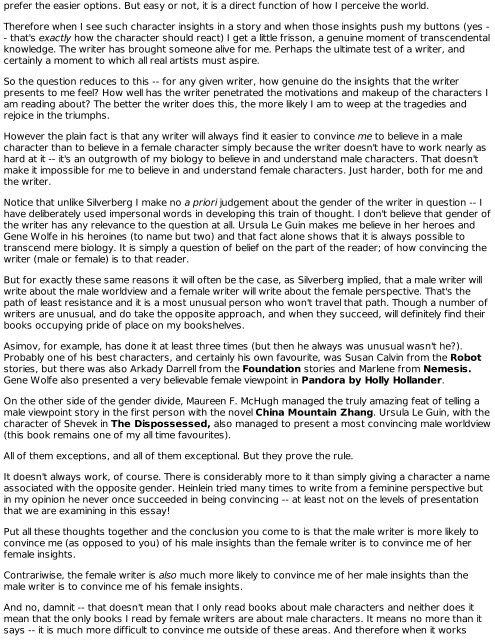Triffids Beard 2 - The Bearded Triffid
Triffids Beard 2 - The Bearded Triffid
Triffids Beard 2 - The Bearded Triffid
You also want an ePaper? Increase the reach of your titles
YUMPU automatically turns print PDFs into web optimized ePapers that Google loves.
prefer the easier options. But easy or not, it is a direct function of how I perceive the world.<br />
<strong>The</strong>refore when I see such character insights in a story and when those insights push my buttons (yes -<br />
- that's exactly how the character should react) I get a little frisson, a genuine moment of transcendental<br />
knowledge. <strong>The</strong> writer has brought someone alive for me. Perhaps the ultimate test of a writer, and<br />
certainly a moment to which all real artists must aspire.<br />
So the question reduces to this -- for any given writer, how genuine do the insights that the writer<br />
presents to me feel? How well has the writer penetrated the motivations and makeup of the characters I<br />
am reading about? <strong>The</strong> better the writer does this, the more likely I am to weep at the tragedies and<br />
rejoice in the triumphs.<br />
However the plain fact is that any writer will always find it easier to convince me to believe in a male<br />
character than to believe in a female character simply because the writer doesn't have to work nearly as<br />
hard at it -- it's an outgrowth of my biology to believe in and understand male characters. That doesn't<br />
make it impossible for me to believe in and understand female characters. Just harder, both for me and<br />
the writer.<br />
Notice that unlike Silverberg I make no a priori judgement about the gender of the writer in question -- I<br />
have deliberately used impersonal words in developing this train of thought. I don't believe that gender of<br />
the writer has any relevance to the question at all. Ursula Le Guin makes me believe in her heroes and<br />
Gene Wolfe in his heroines (to name but two) and that fact alone shows that it is always possible to<br />
transcend mere biology. It is simply a question of belief on the part of the reader; of how convincing the<br />
writer (male or female) is to that reader.<br />
But for exactly these same reasons it will often be the case, as Silverberg implied, that a male writer will<br />
write about the male worldview and a female writer will write about the female perspective. That's the<br />
path of least resistance and it is a most unusual person who won't travel that path. Though a number of<br />
writers are unusual, and do take the opposite approach, and when they succeed, will definitely find their<br />
books occupying pride of place on my bookshelves.<br />
Asimov, for example, has done it at least three times (but then he always was unusual wasn't he?).<br />
Probably one of his best characters, and certainly his own favourite, was Susan Calvin from the Robot<br />
stories, but there was also Arkady Darrell from the Foundation stories and Marlene from Nemesis.<br />
Gene Wolfe also presented a very believable female viewpoint in Pandora by Holly Hollander.<br />
On the other side of the gender divide, Maureen F. McHugh managed the truly amazing feat of telling a<br />
male viewpoint story in the first person with the novel China Mountain Zhang. Ursula Le Guin, with the<br />
character of Shevek in <strong>The</strong> Dispossessed, also managed to present a most convincing male worldview<br />
(this book remains one of my all time favourites).<br />
All of them exceptions, and all of them exceptional. But they prove the rule.<br />
It doesn't always work, of course. <strong>The</strong>re is considerably more to it than simply giving a character a name<br />
associated with the opposite gender. Heinlein tried many times to write from a feminine perspective but<br />
in my opinion he never once succeeded in being convincing -- at least not on the levels of presentation<br />
that we are examining in this essay!<br />
Put all these thoughts together and the conclusion you come to is that the male writer is more likely to<br />
convince me (as opposed to you) of his male insights than the female writer is to convince me of her<br />
female insights.<br />
Contrariwise, the female writer is also much more likely to convince me of her male insights than the<br />
male writer is to convince me of his female insights.<br />
And no, damnit -- that doesn't mean that I only read books about male characters and neither does it<br />
mean that the only books I read by female writers are about male characters. It means no more than it<br />
says -- it is much more difficult to convince me outside of these areas. And therefore when it works


